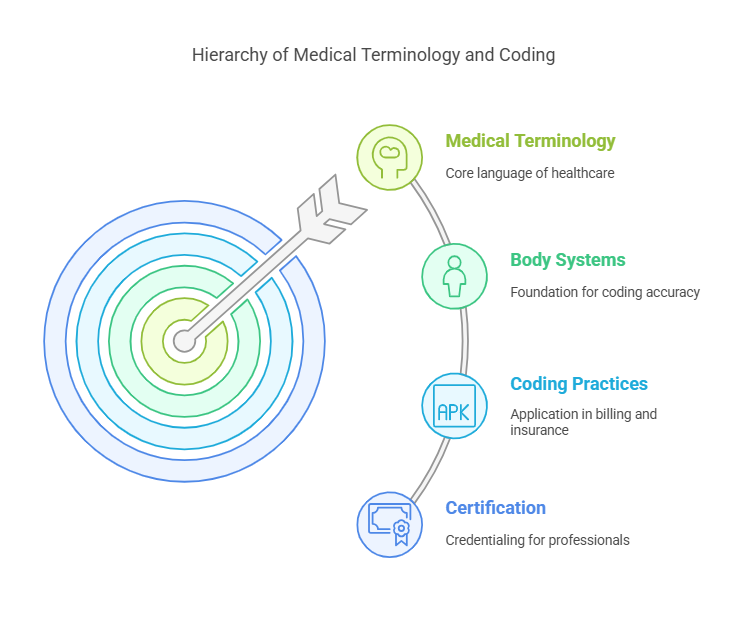Anatomy and Physiology for Medical Billing and Coding: A Comprehensive Guide
Medical billers play a crucial role in the healthcare industry by processing insurance claims, ensuring accurate billing, and helping healthcare providers receive appropriate reimbursements. To perform their job effectively, they must have a strong understanding of anatomy, physiology, and medical terminology. These subjects help them interpret medical records, assign accurate codes, and ensure compliance with healthcare regulations.
Understanding Medical Terminology
Medical terminology is the standardized language used across the healthcare industry. A strong grasp of medical terminology enables billers to navigate patient charts, code conditions accurately, and facilitate smooth communication between healthcare providers and insurance companies.
This specialized language is derived primarily from Greek and Latin and is essential for classifying diseases, treatments, and procedures. Without a clear understanding of these terms, errors in coding could lead to claim denials, delayed reimbursements, and potential legal issues for healthcare providers.
Medical billers and coders, especially those with medical billing and coding certification from AMBCI, must also be familiar with the 14 major body systems, including the cardiovascular, digestive, endocrine, immune, integumentary, musculoskeletal, nervous, reproductive, respiratory, and urinary systems. Knowing how these systems function allows them to identify relevant medical codes accurately.
The Importance of Anatomy and Physiology in Medical Billing
Anatomy and physiology provide essential knowledge about the structure and function of the human body. Billers and coders must understand how different medical conditions affect body systems to assign the correct codes for diagnoses and treatments.
For example, if a physician diagnoses a patient with chronic obstructive pulmonary disease (COPD), the medical biller needs to recognize that this condition affects the respiratory system. This knowledge ensures that the appropriate International Classification of Diseases (ICD-10) code is applied, which is critical for insurance claims and reimbursement.
Additionally, understanding human physiology helps billers recognize common medical procedures and treatments, making it easier to process claims efficiently. By applying their knowledge of anatomy and physiology, they contribute to an efficient healthcare billing system that benefits both providers and patients.
Course Materials for Medical Billing and Coding
Training programs for medical billing and coding often include courses in anatomy, physiology, and medical terminology. These courses cover:
An overview of the major body systems
Disease processes and their impact on body functions
Commonly prescribed medications and treatments
Laboratory tests and diagnostic procedures
Standard medical abbreviations used in documentation
These materials prepare students for certification exams and ensure they can work effectively in hospitals, clinics, and insurance companies. As medical billing regulations evolve, ongoing education remains crucial for staying updated on industry changes.
Lesser-Known Facts About Medical Billing and Coding
Medical coding began in the 17th century. The earliest recorded use of medical classification systems dates back to the London Bills of Mortality, which tracked plague deaths.
The London Bills of Mortality, initiated in 1665-1666 during the Great Plague of London, categorized deaths by cause, marking an early form of medical classification. Coding Clarified+1UW Faculty+1
The ICD-10 coding system has over 70,000 codes. This vast system is constantly updated to include new diseases, treatments, and medical procedures.
ICD-10-CM codes represent medical diagnoses and detailed clinical information, highlighting the extensive nature of the coding system. IMO Health
Medical coders can specialize. Some professionals focus on areas like oncology, cardiology, or dermatology to ensure accuracy in highly specialized fields.
Medical coders often specialize in areas such as oncology, cardiology, or dermatology to ensure accurate coding in these specialized fields.
Errors in medical billing contribute to billions in losses annually. Mistakes in coding can lead to fraudulent claims, denied reimbursements, and financial losses for healthcare providers.
Using outdated or improper ICD-10 codes is a leading cause of denied claims, emphasizing the financial impact of coding errors. Medwave Billing & Credentialing
Medical coders work in non-hospital settings. Apart from hospitals and clinics, they can work in law firms, insurance companies, and even remotely from home.
Medical coders work in various settings, including law firms, insurance companies, and remotely, beyond traditional hospital environments.
AI is transforming medical billing. New artificial intelligence tools help detect errors and automate claim processing, improving efficiency and reducing human errors.
Staying up-to-date with new billing codes, facilitated by AI tools, significantly reduces the risk of errors in medical billing and coding. Empeek
Frequently Asked Questions (FAQs)
-
No, but you need to complete specialized training in medical billing, coding, and medical terminology to understand healthcare documentation accurately.
-
Certification programs typically take between six months and two years, depending on the program and level of certification.
-
Yes, with the increasing demand for healthcare services and the need for accurate medical documentation, medical billing and coding jobs are expected to grow steadily through 2025 and beyond.
-
Common errors include incorrect patient information, wrong diagnosis codes, duplicate billing, and missing claim details. These mistakes can lead to claim denials or delays.
-
5. Can medical billers work remotely?
Yes, many medical billing professionals work from home, especially with the rise of electronic health records (EHR) and cloud-based billing systems.
Conclusion
Understanding anatomy, physiology, and medical terminology is essential for medical billers and coders. These skills help them accurately translate medical records into standardized codes, ensuring proper reimbursement for healthcare providers. With technological advancements and industry growth, medical billing and coding continue to offer promising career opportunities in 2025 and beyond.




